Intro by Fitz | Article by Debra Freeman and Fitz | Photography by Fitz
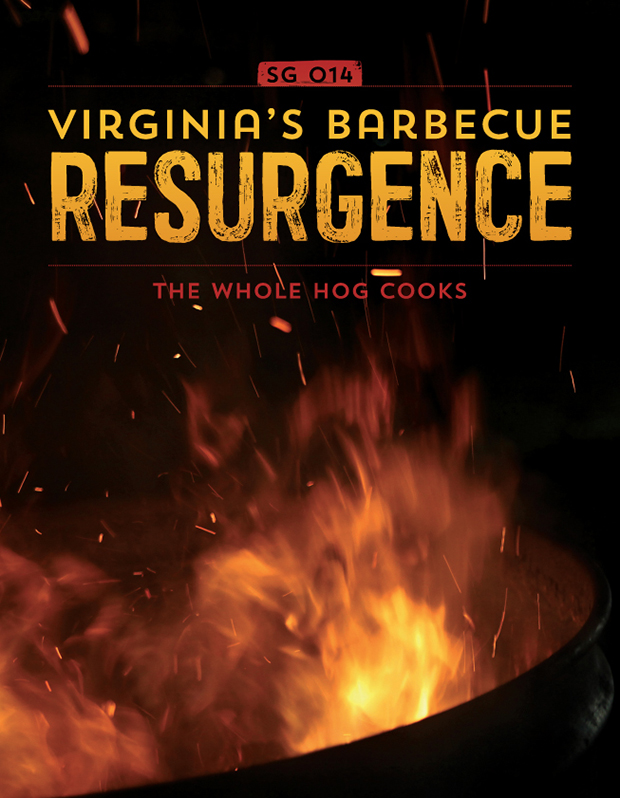
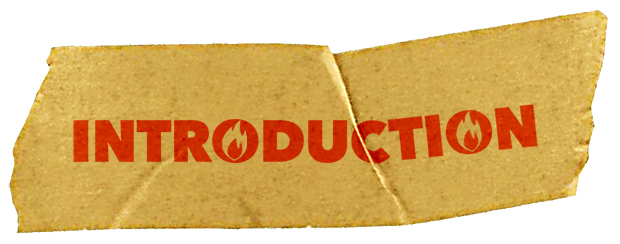
Recently, I got a glimpse into what it must have been like for the original pitmasters to barbecue whole hogs in pits all the way back in the early days of America. But it was only a small glimpse. After all, I had the luxury of choosing whether or not I wanted to barbecue, some cool air at my back, a bit of modern technology at my disposal and the absence of severe penalty if I screwed up. That being said, after Joe, Alex, Sam and I finished the pit digging, the barbecue itself, and the breakdown and clean up afterward, I could barely walk. So imagining what it must have been like for African and later African-American pitmasters, the originators of barbecue as we know it today, to execute these cooks without any of the advantages I enjoyed still humbles me.
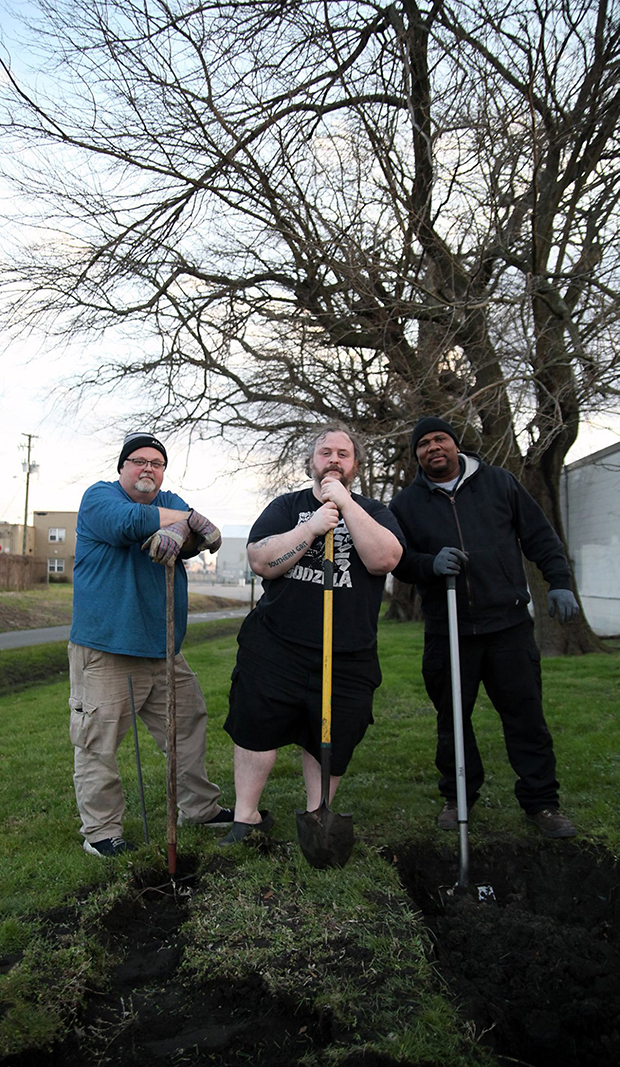
Left to Right: Author Joseph R. Haynes, Southern Grit Magazine Founder Fitz, and Suffolk, Virginia Pitmaster Alex Bazemore
Almost weekly I see a new food documentary series/film on one of the many streaming platforms, and often, a barbecue segment or focus is featured. Barbecue, after all, is synonymous with America. What I never see, however, is a Virginian focus – hell, even a Virginia mention. Do the executive producers at say, PBS’ Somewhere South not realize that barbecues as we know them today in America began in Virginia and then spread out to the places like North Carolina, Memphis, Tennessee, and South Carolina that they feature so prominently?
When discussing American barbecue on their shows, do the likes of Vivian Howard or David Chang not find the stories of Virginian Pitmasters Thomas Griffin, James Dabney, or Juba Garth as interesting as say a mullet smoking or a new fusion “barbecue” hybrid? Or maybe they just don’t know their stories? They should though, because if you are going to dive into barbecue, particularly with a southern audience in mind, you do the viewers a disservice to only give them a blurb or to completely skip over how Black Virginian Pitmasters saw indigenous cooking techniques, and joined that along with European spices to create America’s first unique cuisine.
To be clear, personally, I stop short of this being a racial issue exclusively. For example, Pitmasters Rodney Scott (in South Carolina), Ed Mitchell (in North Carolina) and Helen Turner (in Tennessee) loom large on these shows and obviously should. But when it comes time to show the lines on the map of the south traveled for barbecue in these documentaries, there are never Virginian stops. This has to change.
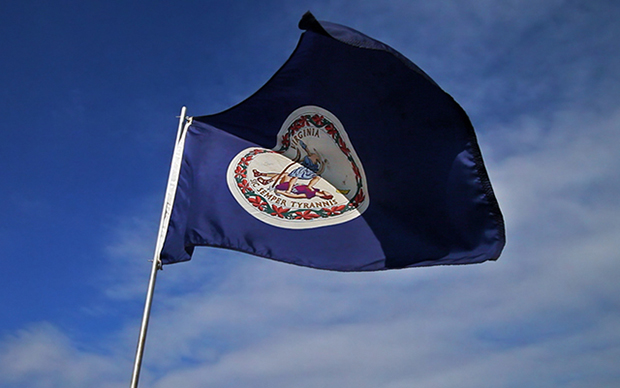
Virginia state flag flying over the pit at 1752 Barbecue’s Virginian whole hog cook in Woodstock, Virginia
The continued Virginian omission was the catalyst for Southern Grit bringing authentic Virginian whole hog barbecue to Norfolk, VA at Barbecue Wars 2 this February. And this is why the work of 1752 Barbecue in Woodstock, VA, the books of author Joe Haynes in Fredericksburg, VA, the drive of and skill of Pitmasters Sam Clayton in Fredericksburg, VA and Alex Bazemore in Suffolk, VA loom so large in my mind and a growing number of informed Virginians who love barbecue.
-Fitz

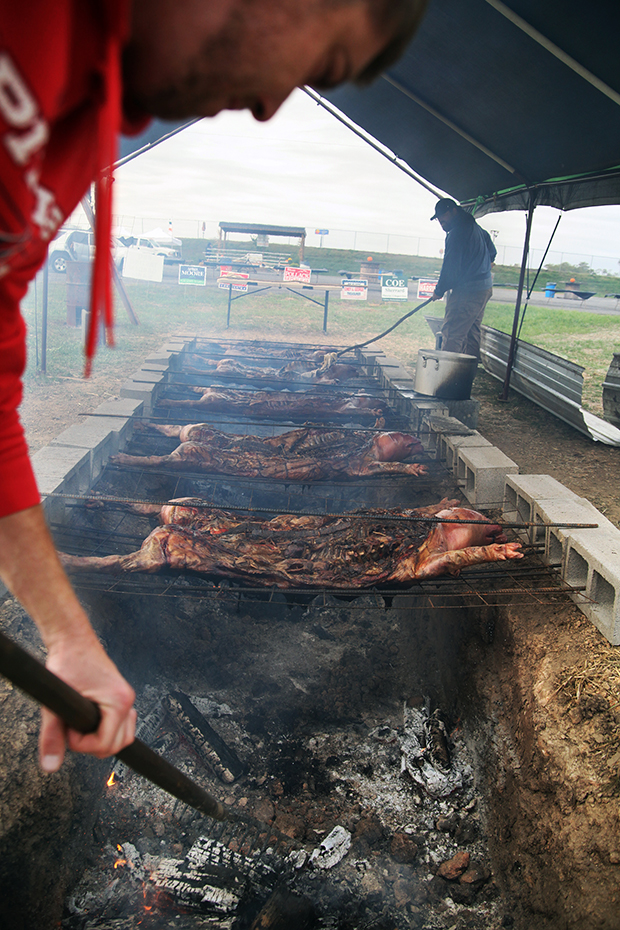
Pitmaster Craig George (right) and helper Andrew Case (left) tending the barbecue pit in Woodstock, Virginia
On October 5th, 2019, in Woodstock, Virginia, Craig George and Justin Wightman, owners of 1752 Barbecue, cooked an authentic Virginian whole hog barbecue. With help from friend Andrew Case and locals, a twenty five foot long, four feet wide, two foot deep pit was dug. Using wood fired coals shoveled under the hogs for nearly twenty-four hours, five, hundred and fifty pound local whole hogs were cooked the Virginian way for the gathering at Shenandoah Autumnfest, an annual fall festival.

Craig George (left) and Justin Wightman (right) tending the pit in Woodstock, Virginia
————————————————————————————————————–
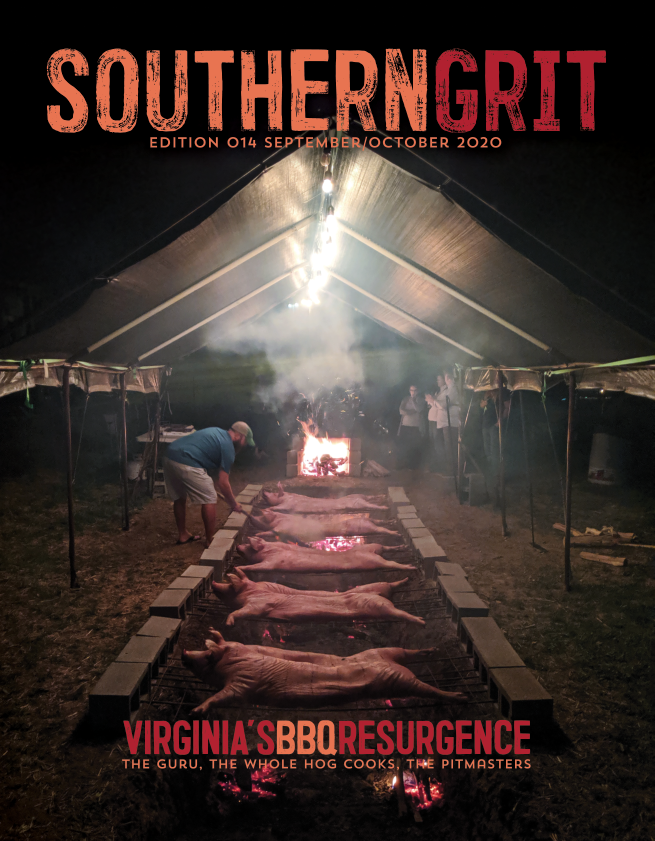
Only a few copies of the 014 print edition are left for purchase. Order yours now at the following link http://southerngritmagazine.com/merch/
————————————————————————————————————-

Leap Day this year wasn’t just special because it only comes around every four years. This year, as a part of Barbecue Wars 2: Hampton Roads, a whole hog barbecue was prepared in the traditional Virginia style, which hasn’t been seen publicly in Norfolk in years, and it took a village to pull it off.
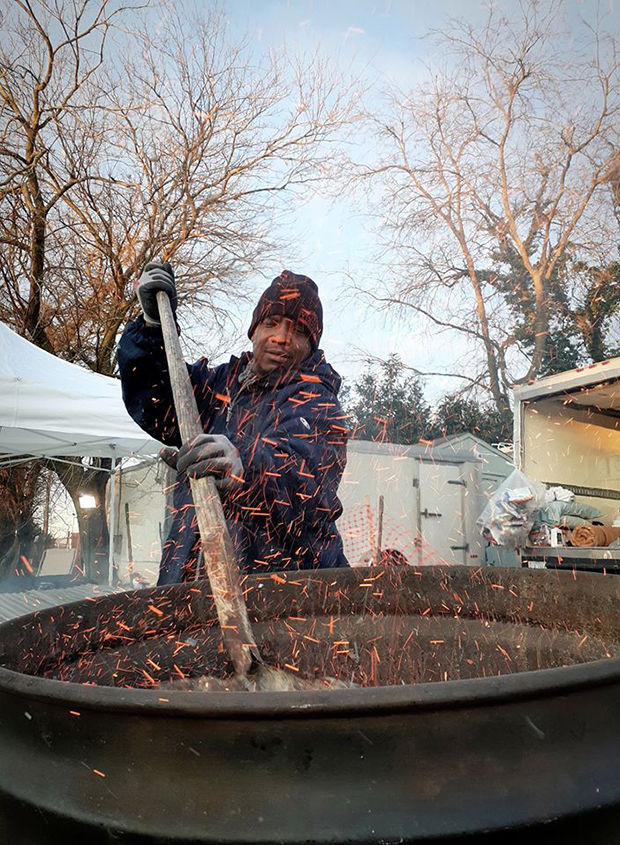
Pitmaster Sam Clayton making wood coals at Barbecue Wars 2
Pitmaster Alex Bazemore of Maine Dish LLC, Fredericksburg Pitmaster Sam Clayton, Southern Grit Magazine Founder Josh Fitzwater and his father Tony Fitzwater, Food Writer Debra Freeman, Hampton Chef Sam Garrity, Norfolk Pitmaster Bob Roberts, and Benchtop Brewing Company Owner Eric Tennant, along with students from the Culinary Institute of Virginia were all essential in every aspect.
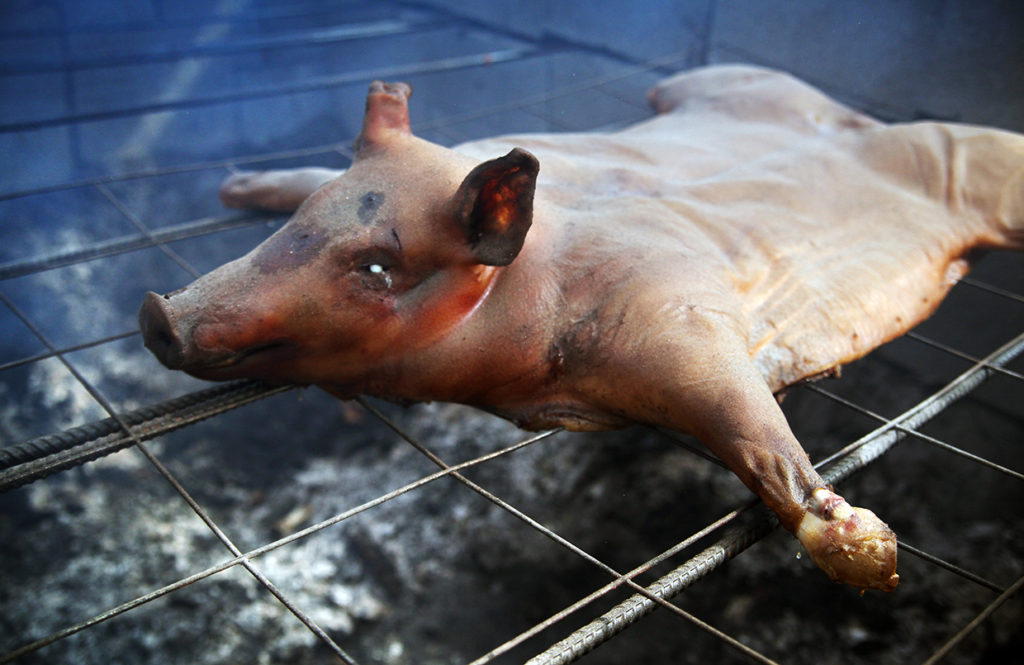
Whole Hog halfway through the cook at Barbecue Wars 2
From driving the two 85-100 pound hogs down from Burks Farm in Providence Forge, Virginia, to digging a hole to cook the hogs for eight hours, to hand chopping the hogs once they were ready – it was all needed in order to get authentic Virginia barbecue to the masses. Along with planning and overseeing the cook, Virginian food author and Pitmaster Joseph R. Haynes gave event attendees a lecture on what it takes to prepare and taste a bit of culinary history.
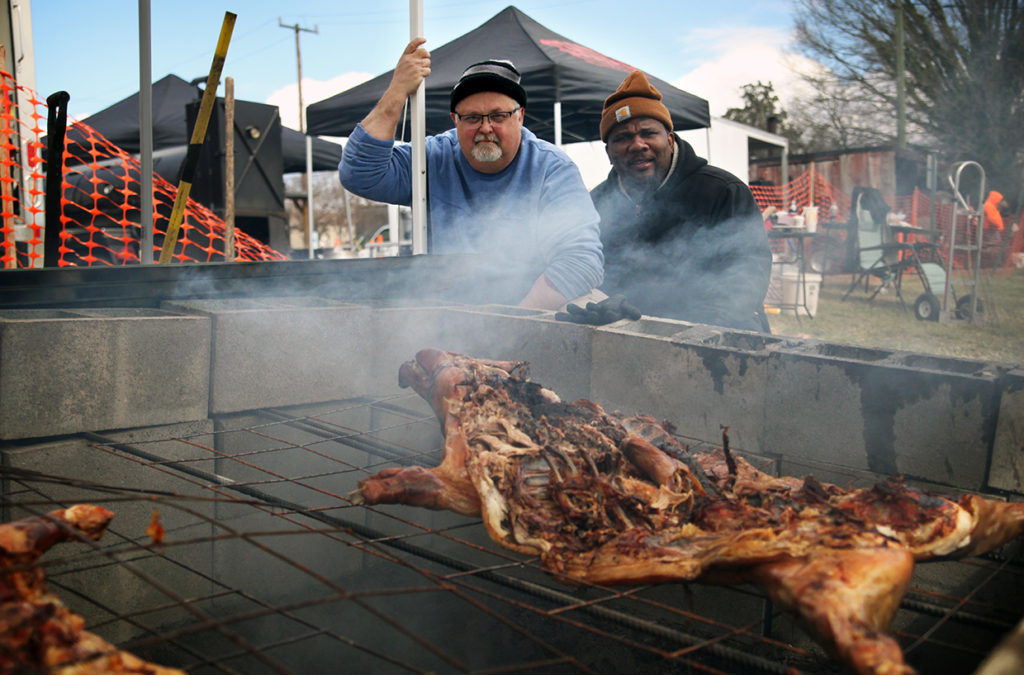
Haynes (left) and Bazemore (right) at the finish of the whole hog cook
As Virginia is the birthplace of American barbecue, it was vital to share the legacy of how the combination of traditions from enslaved Africans and African-Americans, Native Americans and Europeans, and the labor and ingenuity of the enslaved carried a uniquely Virginian tradition throughout the south, and eventually to the rest of the country and beyond.

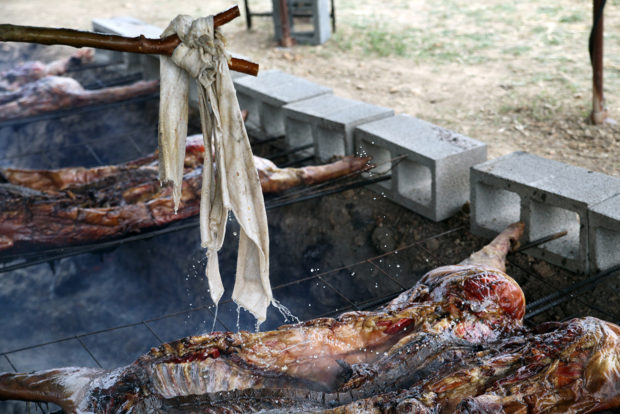

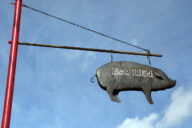
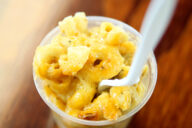
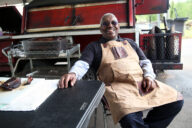

2 Comments
What a fantastic article with great history and perspective. I know Alex and Maine Dish and that man can cook. His food is the real deal!!
Thank you for reading and agreed Antonio, Alex is quite the Pitmaster!